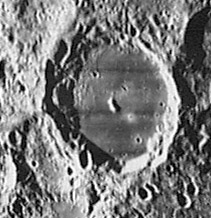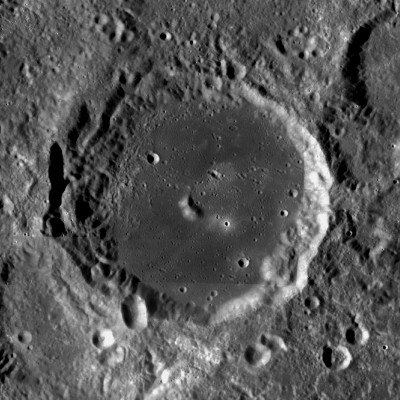Difference between revisions of "Hubble"
| Line 17: | Line 17: | ||
[http://en.wikipedia.org/wiki/Hubble_(crater) Hubble]<br /> <br /> | [http://en.wikipedia.org/wiki/Hubble_(crater) Hubble]<br /> <br /> | ||
==Additional Information== | ==Additional Information== | ||
| − | * Depth data from [http://the-moon.us/wiki/Kurt%20Fisher% | + | * Depth data from [http://the-moon.us/wiki/Kurt%20Fisher%20Crater%20Depths Kurt Fisher database] |
** Westfall, 2000: 3.16 km | ** Westfall, 2000: 3.16 km | ||
* [http://the-moon.us/wiki/Central%20peak%20composition Central peak composition]: A & GNTA1 ([http://the-moon.us/wiki/Tompkins%20%26%20Pieters%2C%201999 Tompkins & Pieters, 1999]) | * [http://the-moon.us/wiki/Central%20peak%20composition Central peak composition]: A & GNTA1 ([http://the-moon.us/wiki/Tompkins%20%26%20Pieters%2C%201999 Tompkins & Pieters, 1999]) | ||
Latest revision as of 02:53, 16 April 2018
Contents
[hide]Hubble
(Formerly Plutarch A)
|
Lat: 22.1°N, Long: 86.9°E, Diam: 80 km, Depth: 3.16 km, Rükl: 27 |


left: Lunar Orbiter IV 165 h3 . right: LROC
Images
LPOD Photo Gallery Lunar Orbiter Images Apollo Images
Hubble and its low-albedo floor are also detectable near the central part of the curved horizon in Apollo 17's oblique north-looking Fairchild camera frame AS17-M-0901.
Research Danny Caes
Maps
(LAC zone 45C2) USGS Digital Atlas PDF
Description
Description: Wikipedia
Additional Information
- Depth data from Kurt Fisher database
- Westfall, 2000: 3.16 km
- Central peak composition: A & GNTA1 (Tompkins & Pieters, 1999)
Nomenclature
- Edwin Powell Hubble(November 20, 1889 – September 28, 1953) was an American astronomer. Hubble's arrival at Mount Wilson in 1919 coincided roughly with the completion of the 100-inch Hooker Telescope, then the world's largest telescope. Hubble and Milton L. Humason discovered a rough proportionality of the objects' distances with their redshifts.
- Name given by Arthur and Whitaker in Rectified Lunar Atlas (1963) and approved by IAU in 1964 (Whitaker, 1999, p.234).
LPOD Articles
Bibliography
Edwin P. Hubble in the Sourcebook Project (William R. Corliss)
- In Mysterious Universe, a handbook of astronomical anomalies (1979) :
(articles in which Hubble is mentioned)
- Page 592: New Light on Quasars: unraveling the mystery of BL Lacertae (William D. Metz, Science, 1978).
- Page 612: Was there really a Big Bang? (G.Burbidge, Nature, 1971).
- Page 623: The Geritol Universe: tired light (Science News, 1975).
- Page 624: Controversy over the Extragalactic Distance Scale (M.Rowan-Robinson, Nature, 1976).